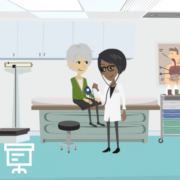Tips for Discussing MPN Clinical Trials With Your Doctor
Tips for Discussing MPN Clinical Trials With Your Doctor from Patient Empowerment Network on Vimeo.
Myeloproliferative neoplasm (MPN) expert Dr. Mark Heaney shares advice for talking to your doctor about clinical trials and lists credible resources to help patients find information about clinical trials.
Dr. Mark Heaney is a hematologic oncologist and Associate Professor of Medicine at the Herbert Irving Comprehensive Cancer Center of Columbia University. Learn more about Dr. Heaney, here.
Related Programs

|

|

|
Transcript
Katherine Banwell:
When it comes to new developments in research, how can patients discuss this type of information with their doctor to find out if there’s a new approach or a clinical trial that might be right for them?
Dr. Heaney:
Well, I think the first question is to ask if there are clinical trials available.
Unfortunately, in the U.S., clinical trials aren’t available in every location, and often, patients have to go to a larger medical center, often an academic medical center or research center, to have access to clinical trials, and I think that’s one of the inherent challenges of our health system. I don’t have an answer to that.
But, there are lots of places for patients to find out information about clinical trials.
The National Cancer Institute has a website that’s really active. There are a number of blood-disease-focused and MPN-focused patient organizations that patients should avail themselves of. The Leukemia & Lymphoma Society is one that’s been a long advocate for patients, and there are a number of MPN-focused organizations as well.
And so, I think patients should maybe go to the Internet and look around a little bit to get a little information for themselves, but I think also asking their physicians if they’re aware of trials that are available. Within most of the major urban centers, there may be multiple institutions that have a different collection of clinical trials, and I think if you’re being taken care of by a physician at one of those centers, asking him or her if there is a trial that may not be at that center, but might be available in New York or who they might talk to to find out about those trials is a really reasonable thing to do, and a way for patients to self-advocate.
But, it often does require more energy to do that, and I think one of the challenges for some patients with MPNs is that the disease takes away some of that energy, and so, enlisting a family member or friend to help give voice, to advocate for you, is another way of overcoming that.










